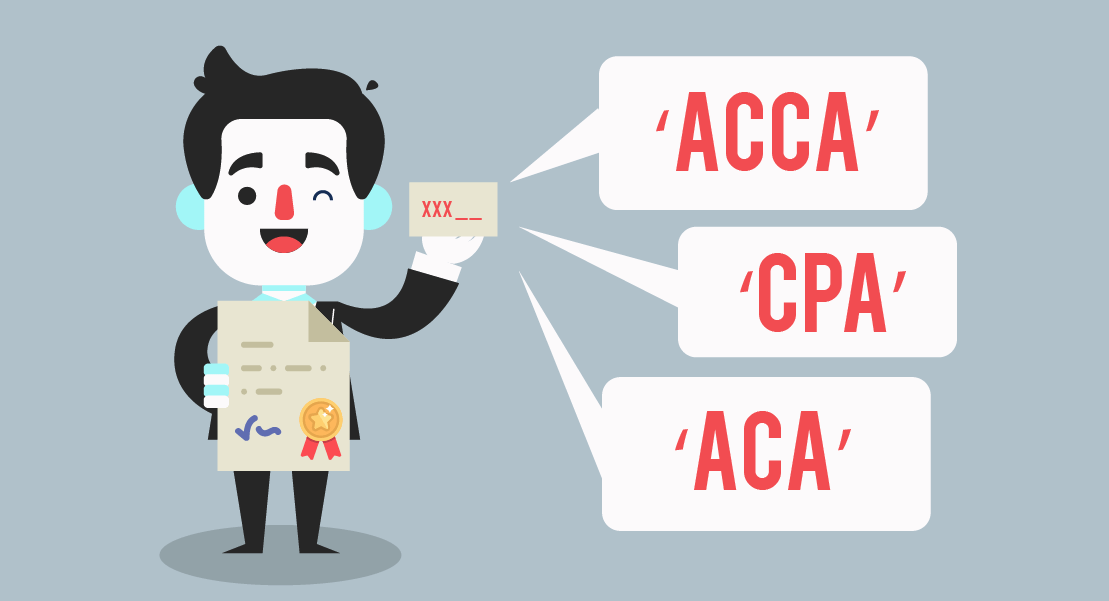7 Reasons a Professional Accounting Qualification Is Worth Your Time and Money
Is an Accounting Degree sufficient or should you enhance your CV by taking a professional accounting qualification like ACCA or ICAEW? Here are 7 reasons why it may be worth considering.
Updated 14 Sep 2017


Let’s face it – everyone needs an accountant.
From your neighbourhood kedai runcit and hipster cafes to multinational corporations and giant conglomerates, companies rely heavily on accountants. This is not just to ensure compliance with the law (think tax and audit) but also to make strategic financial decisions.
Undeniably, accountants are crucial cogs in a business machine. And if you've decided to pursue this exciting, high-opportunity field, a burning question that you may ask is...
Should you pursue a professional qualification such as ACCA, ICAEW or CPA, or should you stick with a degree? Does a professional qualification really give you an edge over the rest of your peers when it comes to getting a foot in the door, climbing the corporate ladder and most importantly, salary and compensation?
If you’re stuck trying to figure out if you should take ACCA, ICAEW, CPA or some other professional accounting qualification, here are 7 reasons why it may be worth pursuing.
#1. High demand for professional accountants

Going back thousands of years, accounting is a time-old profession that traces back to ancient civilisations. But instead of becoming a vanishing occupation as technology floods the world, there is an increasing demand for accountants to support economic growth and complex financial decision making.
In fact, it is estimated that Malaysia will need 60,000 professional accountants by 2020 as our nation moves towards a developed economy.
So where are we today?
We currently have about 36,000 accountants in Malaysia, with just 25,000 professional accountants amongst them. This is only 60% of the nation’s planned target.
To address this issue, the government has put in motion a string of initiatives to promote accountancy as a profession. This includes strengthening cooperation between the accounting industry and universities, increasing funding for accountancy education and widening pathways into the profession.
So rest assured that there is plenty of support for you if you go down this path.
DID YOU KNOW
Yayasan Peneraju Pendidikan Bumiputera offers scholarships to bumiputeras to pursue professional accountancy certifications. The scholarship covers tuition and exam fees, accommodation and allowances. As one of the approved institutions, IPAC Education (a division under INTEC that provides professional accountancy programmes) boasts high passing rates, achieving 29.9% above the world’s average for CAT.
#2. Employers prefer hiring those with professional qualifications

Yes, it's true – employers do have a preference for recruiting candidates with professional qualifications.
In a survey conducted by The Committee to Strengthen the Accountancy Profession (CSAP), 64% of employers indicated that their main criteria when recruiting accountants are candidates with professional qualifications and relevant market experience.
Now, this isn’t just a cry by the top accounting firms such as Deloitte, Ernst & Young, KPMG and PwC. Other major companies across various industries like Citibank, PETRONAS, Sime Darby and Khazanah also echo the same sentiment, with 35% of employers indicating that the quality of the current accounting talent pool is below expectation.
The fact remains that accounting is firmly rooted as a professional occupation, one that holds high standards and requires professional skills, knowledge and competence. So it is no surprise that employers are seeking those who can uphold accounting standards and quality.
DID YOU KNOW
Professional accountancy students from IPAC Education @ INTEC are heavily involved in a Nurture & Development Programme that focuses on developing soft skills, critical thinking, leadership skills and personal development. This gives students an added advantage, not just during their job search but also in their career as professional accountants.
#3. You are likely to enjoy better career prospects

It doesn’t just stop at first impressions and landing you your first job. There is evidence that accountants with professional qualifications enjoy a better career progression too.
Another survey conducted by The Committee to Strengthen the Accountancy Profession (CSAP) showed that 24% of the board members in the top 100 public-listed companies in Malaysia were professional accountants versus only 5% accounting graduates without professional qualifications. That means that for every 1 accounting degree-holder who is a board member, there are 5 professional accountants who hold positions as board of directors!
The same can be said for senior management positions. In 41 of the top 100 public-listed companies, 15% were professional accountants compared to only 4% accounting graduates. Again, professional accountants led by a ratio of 4:1.
The presence of professional accountants as board members and in senior management positions shows the importance of their skill sets and their contribution in leadership, governance, value creation and financial reporting.
#4. Professional qualifications are globally recognised and well-respected across the world

Mention the letters ACCA, ICAEW, CIMA or CPA and watch as employers nod silently with recognition and approval. Securing a professional qualification is no walk in the park and such credentials are worth its weight in gold in the eyes of employers.
There is something to be said about possessing professional qualifications in an era where degrees no longer seem to be enough. In fact, according to a report by HSBC, 65% of Malaysian parents feel that postgraduate qualifications are necessary in order for their children to achieve their life goals.
Furthermore, we are living an increasingly mobile world, with organisations across the globe looking for professional accountants to provide high-quality financial information and ensure good proper governance.
With the establishment of the ASEAN Economic Community, it will be even easier for professional accountants in Malaysia to seek accounting jobs and opportunities within the ASEAN region.
DID YOU KNOW
The need for English language proficiency is extremely important in the accounting profession, given that English is the language of business. Recognising this, IPAC Education @ INTEC has a huge focus on mastering language and communication skills, with English teachers even training students how to speed read to extract pertinent points to answer exam questions.
#5. You will gain specialised and comprehensive knowledge

Arguably, a degree gives you a more wholesome experience, with subjects such as law, marketing and information technology thrown into the mix. There is also a component of group assignments, coursework and research methodologies, which professional accounting qualifications may lack.
However, in comparison to degrees, a professional accounting qualification will give you a deeper, more specialised knowledge about accounting. The professional level in ACCA, for example, covers advanced techniques and technical knowledge encompassing taxation, audit and financial management in much greater detail compared to a degree.
If you’re concerned that this will make you an accounting monkey that only knows how to go through the motions, you cannot be further from the truth.
For starters, ACCA is beginning to redesign and enhance some of their modules to keep up with the demands of the industry. This includes introducing a Strategic Business Leader module that incorporates real-world scenarios, requiring students to blend technical, professional and ethical skills in their responses.
DID YOU KNOW
Professional exams are often seen as a “do or die” experience since everything is based on final exams with zero coursework. IPAC Education @ INTEC prepares you by having rigorous continuous assessment with mock exams and progress tests throughout your study. This helps to address any pressing issues that you may have before the real exam.
#6. Gain a Bachelor’s and Master’s Degree along the way

While certain professional accounting qualifications can be considered equivalent to a bachelor’s degree (sometimes even up to a master’s), ultimately, professional qualifications are not recognised as degrees. This is perhaps one of the biggest concerns students have.
Will you be losing out by not having this all-important degree that’s traditionally associated with job security and financial success?
The good news is that professional accounting bodies recognise the importance of academic degrees, which has a research component where most professional qualifications lack.
For starters, ACCA offers students a pathway to obtain a BSc (Hons) Degree in Applied Accounting from Oxford Brookes University. In addition, ACCA has also tied up with the prestigious University of London where students can obtain their ACCA qualification and an MSc in Professional Accountancy at the same time.
The combination of having both a professional qualification AND a degree will certainly increase your competitive edge and enhance your employability, making you an unstoppable force!

#7. Add prestigious acronyms to your name

Tell your parents to rejoice! While they may not have been able to realise their dreams of having a Dr. in the family (#sorrymom), there are other alphabets that you can add to your name.
Completing a professional qualification will give you the opportunity to stick a well-respected ‘ACCA’, ‘CPA’ or ‘ACA’ (for ICAEW members) in your name card, showing the world that you have conquered a barrage of professional papers, overcome hundreds of sleepless nights and survived thousands of cups of coffee and Red Bull.
While you are obviously discouraged to be flashy about your credentials, you will be pleased to know that just like other professionals (doctors, architects, engineers, etc.) accountants are generally held in high regard. Having a professional accounting qualification will certainly boost your credibility and reputation.







